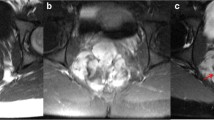Purpose:
To investigate the role of radiation therapy (RT) in the management of desmoid tumors.
Patients and Methods: Retrospective analysis was performed on 28 patients with desmoid tumors treated with radiation therapy between March 1989 and March 1999. Tumor site was intraabdominal in three, abdominal wall in three and extraabdominal in 22 patients. Median tumor dose was 48 Gy (range 36–60 Gy). Radiation therapy was delivered postoperatively in 26 of 28 patients, two patients received radiation therapy for unresectable recurrent tumors.
Results: Median follow-up was 46 months (range 13–108 months). Actuarial 5-year control rate was 73%. We observed six recurrences, located within the radiation field in one patient, out of field in two and at the field margin in three patients. All patients with intraabdominal tumors have been controlled without severe side effects.
Conclusions: Radiation therapy is an effective treatment after incomplete resection of desmoid tumors. We did not observe a benefit for tumor doses exceeding 50 Gy. In some patients with circumscribed intraabdominal desmoid tumors, radiation therapy might be a treatment option with low toxicity, if 3-D treatment planning is utilized.
Hintergrund:
Der Stellenwert der Strahlentherapie (RT) bei der Behandlung von Desmoiden soll untersucht werden.
Patienten und Methode: Die Untersuchung umfasste 28 Patienten mit Desmoiden, die zwischen März 1989 und März 1999 eine Strahlentherapie erhielten. Die Tumorlokalisation war bei drei Patienten intraabdominell und bei 22 Patienten extraabdominell. Bei drei Patienten war die Bauchwand betroffen. Die mediane Tumordosis lag bei 48 Gy (36–60 Gy). Die Strahlentherapie erfolte bei 26 von 28 Patienten postoperativ, zwei Patienten erhielten eine Bestrahlung aufgrund inoperabler Rezidive.
Ergebnisse: Die mediane Nachbeobachtungszeit lag bei 46 Monaten (13–108 Monate). Die aktuarische Kontrollrate nach 5 Jahren betrug 73%. Wir haben sechs Rezidive beobachtet, davon waren eines innerhalb und zwei außerhalb des ehemaligen Bestrahlungsvolumens gelegen. Drei Patienten entwickelten ein Feldrandrezidiv. Alle drei intraabdominellen Desmoide konnten ohne schwere Nebenwirkungen durch die Bestrahlung kontrolliert werden.
Schlussfolgerungen: Die Strahlentherapie ist effektiv bei der Behandlung von inkomplett resezierten Desmoiden. Wir konnten keinen Vorteil für eine Dosiseskalation auf Tumordosen > 50 Gy nachweisen. Bei ausgewählten Patienten mit umschriebenen intraabdominellen Desmoidtumoren stellt die Strahlentherapie eine Behandlungsoption mit geringer Toxizität dar, sofern eine dreidimensionale Bestrahlungsplanung erfolgt.
Similar content being viewed by others
Author information
Authors and Affiliations
Additional information
Received: June 27, 2001; accepted: October 18, 2001
Rights and permissions
About this article
Cite this article
Schulz-Ertner, D., Zierhut, D., Mende, U. et al. The Role of Radiation Therapy in the Management of Desmoid Tumors. Strahlenther Onkol 178, 78–83 (2002). https://doi.org/10.1007/s00066-002-0900-4
Issue Date:
DOI: https://doi.org/10.1007/s00066-002-0900-4




